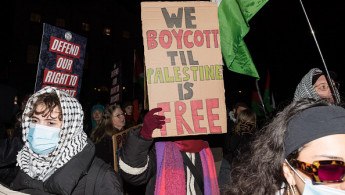UK 'anti-BDS' bill passes third reading following parliamentary vote
The UK government's anti-boycott bill passed its third reading following a debate in the House of Commons on Wednesday night over concerns that the bill contradicts UK foreign policy.
The bill, titled the Economic Activity of Public Bodies (Overseas Matters), was backed with 282 votes for over 235 votes against.
The bill seeks to block public bodies, such as local councils, from conducting their own financial campaigns, and specifically focuses on banning boycotts against Israel, the occupied Palestinian Territories, and the occupied Golan Heights.
The bill has garnered widespread criticism from rights groups who have campaigned against the bill since its introduction into parliament, with protests against the bill being held outside parliament during the vote.
From the outset of the reading the architect of the bill, Communities Secretary Michael Gove, attempted to reassure Parliament that the inclusion of Israel and the occupied territories in the bill did not contradict the UK's support for a two-state solution.
"This clause does not contravene in any way our foreign policy, and does not inhibit the UK from taking action if we believe there is activity in the occupied Palestinian territories that requires to be called out," he said.
His assurance was dismissed by Deputy Leader of the Labour Party Angela Rayner, who labelled the bill "deeply flawed".
She added that "explicitly equating Israel with the occupied Palestinian Territories and the Golan Heights is an unprecedented step" that "seriously undermines" the UK's position for a two-state solution and commitment to international law.
Wayne David, Labour Shadow Minister for MENA, echoed Rayner's concerns, told The New Arab prior to the vote that the bill "undermines the basic building block of a two-state solution by treating the state of Israel in exactly the same way as its occupied territories."
"This bill is rewriting British foreign policy through the back door, and if it becomes law, it would undermine Britain's standing in the world and our commitment to working for a lasting peace in the Middle East," he added.
Amnesty International UK Chief Executive Sacha Seshmukh labelled the bill "draconian", stating that it will "stifle free speech among members of public bodies and undermine efforts to procure goods and services free from slavery, environmental harm and other human rights abuses".
Seshmukh also noted that "it's utterly bizarre that ministers are trying to prevent members of councils and other public bodies from being able to consider the carnage in Gaza when drawing up and implementing their procurement policies".
The bill will now be sent to the House of Lords, parliament's upper house, for review before it can be passed into law.





 Follow the Middle East's top stories in English at The New Arab on Google News
Follow the Middle East's top stories in English at The New Arab on Google News


